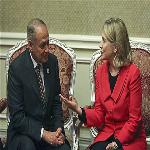12 January 2011

Photo: AP
US Secretary of State Hillary Rodham Clinton (r) speaks with Egyptian Foreign Minister Ahmed Aboul Gheit during their meeting, in Doha, Qatar, Jan 12, 2011
U.S. Secretary of State Hillary Clinton Wednesday said the effort by Hezbollah to undermine the U.N.-backed tribunal in Lebanon is a transparent effort to subvert justice that is destined to fail. Clinton discussed the Lebanese government crisis with U.S. Gulf allies in Doha.
The collapse of the Lebanese coalition government, triggered by the resignation of Hezbollah and other cabinet members, unfolded as Clinton consulted U.S. Gulf allies in Oman and Qatar on the crisis.
At press event in Qatar, Clinton used her strongest language to date to condemn the maneuver by the Iranian-backed Lebanese militia and political party, calling it an obvious move by Hezbollah and "interests outside Lebanon" to subvert and undermine the country's stability and progress.
The cabinet crisis came as the U.N.-backed tribunal on the 2005 assassination of former Lebanese Prime Minister Rafik Hariri prepared to issue indictments expected to include Hezbollah officials.
Obama administration officials see it as a bid by Hezbollah to end Lebanese government support for the tribunal and discredit the inquiry. But Clinton, speaking with Qatari Prime Minister Hamad bin Jassim Al-Thani, said the effort will not succeed.
"Trying to bring the government down as a way to undermine the tribunal is an abdication of the responsibility, but it also will not work," said the U.S. secretary of state. "This tribunal is a creation of the United Nations and the Security Council. It is supported by many governments including my own. Its work will continue, and it is important that as the Prime Minister and I discussed, we work with the Lebanese government, the Lebanese people and our other partners who share our interests in pursuing both stability and justice in Lebanon."
Al-Thani, who doubles as the country's foreign minister, said Qatar has no plans to mediate as it did in previous Lebanese cabinet crises, but said he hoped a Saudi effort to enlist Syria to restrain Hezbollah can still yield results.
"We support the Saudi-Syrian initiative and we have out trust in both leaders," said Al-Thani. "We trust [Saudi] King Abdullah as a person who seeks a solution on a just basis, which will do justice to all parties and to avoid Lebanon slipping into conflict again."
Clinton, who met separately with Qatari leaders and then held a broader meeting with Gulf Cooperation Council foreign ministers, said the tribunal investigation is not just about the death of former Prime Minister Hariri, but also the 22 others killed in the enormous car bomb blast in Beirut.
"What about all the other families and all the other people who came from across Lebanon? So this really goes to a very important point, which is that Lebanon needs now to rally behind its own interests. The Lebanese people need to get beyond political party. And it's not political parties that would be put on trial, it's individuals, who would either be found guilty or innocent of having plotted and carried out such a horrific crime," said Clinton.
A senior U.S. official who briefed reporters traveling with Clinton said Hezbollah staged the cabinet walkout as a "preemptive move" against the tribunal and its pending indictments.
He called Hezbollah efforts to discredit the inquiry, as, among other things, U.S. and Israeli-inspired, "rather specious."
He noted that while withdrawing its cabinet members, the Shiite movement has not sent its supporters into the streets to paralyze Beirut as it did in previous crises in 2006 and 2008. He said such tactics backfired and "tainted" Hezbollah's reputation in Lebanon and much of the Middle East.